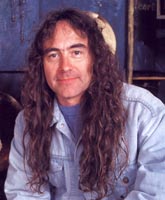Page source: http://www.oocities.org/tus_libros

| There is probably very little you can say about Steve Harris that
the long-standing Maiden fan won't have heard already. The founding
member of the band who first thought of the name 'Iron Maiden' back
in the Seventies when he used to rehearse in his grandmother's front
room; the leader of the gang who has led his troops through the ups
and downs of a tumultuous 20-year recording career; the bass player
with the sound so distinctive it could be the rattle of machine-gun
fire as it thunders out of the speakers on album after album of superb
take-no-prisoners rock music; the football fanatic who could have
played for his beloved West Ham United (where he was on the books,
briefly, as a teenager) before abandoning a budding career as a soccer
star for a lifetime of over-the-top metal mayhem; and the talented
songwriter who, alone, is responsible for some of the greatest musical
moments in a career over- burdened with such jewels - from early mould-breaking
masterworks like 'Rime Of the Ancient Mariner' to latter day creations
like the towering 'Fortunes Of War' or, most recently, the anthemic
'Clansman', from last year's superb 'Virtual XI' collection...what
is there, at this stage of the game, that I can tell you that most
of you don't already know about this hugely charismatic figure?
Well, let's start with the music. While it is true that Steve has always held the whip-hand when it comes to choosing the songs for an Iron Maiden album, not so widely recognised is his willingness to encourage the rest of the band to also contribute as much as they can to the overall scheme of things. Hence, early chip-off-the-old-block flashes of brilliance like guitarist Dave Murray's 'Charlotte The Harlot' and original vocalist Paul Di'Anno's 'Running Free', or mid- period masterpieces like vocalist Bruce Dickinson and guitarist Adrian Smith's '2 Minutes To Midnight' and 'Can I Play With Madness?', right up to modern-day classics like Dave Murray and Blaze Bailey's 'When Two Worlds Collide' from 'Virtual XI' - all of which began life as ideas other members of the band had had and that Steve helped, either directly or indirectly, turn into Maiden-shaped sensations. "It's weird how it works," says Steve. "People always assume I tell everyone what to do. In fact, it's not like that at all. Yes, I usually come in with a few songs I've written on my own - because that's the way I've always worked. But I always try and encourage everybody else to come up with stuff, too. It would be too samey if everything was written by one man all the time. And having people there in the past like Paul and Bruce and Adrian, it all helped take the band in slightly different directions and we did some really good stuff together. "It's the same now - people like Bruce, Janick, Adrian and Dave are never short of ideas, that's for sure!" As for the man himself, the story is no less contradictory. Still growing his hair right down his back, behind the heavily tattooed arms and the "no bullshit" attitude, lies a far more mature and surprisingly sensitive soul than the old cuttings might suggest; a music fan, first and foremost, who genuinely cares more about the integrity of Iron Maiden and its relationship with its fans, than with simple commercial gain. As he says, "I've never written a song in my life for the suits in the boardroom - unlike some bands we could all mention. Maiden's never been about that. And that's why, I think, the fans have stayed with us over the years. They know we really mean it when we say we're an album band, a live band. Hit singles don't matter to us. Never did. It's always been the music that comes first. "When we go in to start writing for a new album, we're doing it to please ourselves, as musicians. If we like it, that's good enough. Then come the fans. We want to like what we do but we also want to do something the Maiden fans will get off on, too. If we can do both, that's the ultimate. As for the critics and the record companies and all that - well, frankly, they don't come into the equation at all! Not while we're actually writing the music. No way! You'd never do anything good again if you worried what that lot thought about it." Indeed. But coming from a tough East London background meant that Steve was never going to be easily pleased or easily fooled. Taking 'no' for an answer was never an option. "Where I come from it was dog eat dog," he says. "I was brought up to believe you had to fight for what you wanted out of life." And that's exactly what Steve and Maiden did; fighting their way up first through the pubs and clubs more obsessed in the Seventies with punk, to find themselves, by the mid-Eighties, right at the top of the rock pile, the biggest, boldest, most uncompromising rock band in the world. A lofty perch Steve has looked out on the world at ever since. "Somebody has to be the leader," he says, "someone has to make the decisions. And as I formed the band, those decisions have always fallen to me. But I wouldn't want people to forget that this isn't some one-man show. This is a band as alive today as it ever was. More so, in lots of ways, in my opinion, than ever before, in fact! Everybody has their part to play and nobody could do it without the others to support them. The band is bigger than any one individual, and the fans know that. Which is why we've survived." Every successful team needs its captain. Fortunately for Maiden, Steve Harris has always worn the captain's armband with honour. Long may he continue to do so.. |